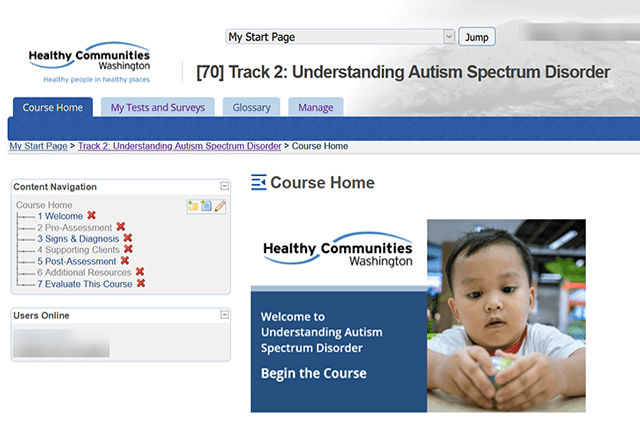A successful online training program begins with your team. Bringing onboard the right brainpower is key in leading successful training for your participants.
Unlike traditional learning programs, your remote learning staff should be well trained in working with an online student base. Online training is an entirely different experience from in-person learning. As such, instructors and other staff members experienced in traditional learning settings may not be able to transfer these skills to remote training.
If you’re ready to launch a successful online training program, here are the essential members you’ll need for your team.
11 roles every online training team should include
Executive Decision-Maker
An executive decision-maker is an advocate for the team and can approve any necessary expenditures. The decision-maker is also the key approver on all decisions—especially ones that require a budget.
This person may not attend meetings, but at least reviews executive summaries or meets with the project leader of the team for status updates. Having executive-level support is essential for a successful program.
An executive-level decision-maker must be internal.
Project Manager
The project manager oversees the full life cycle of the project. The manager in an online training team interfaces with the internal client and e-learning team. They provide schedules and organize deliverables so the project stays on track. In short, the project manager ensures everyone on the team has the information they need to get the job done.
You can hire an outside project manager, but they should work very closely with an internal liaison.
Instructional Designer/Writer
Depending on the nature of your course, and if you’re creating it internally, you will need an instructional designer and/or a writer. The instructional designer takes the instructional material and arranges it in a way that’s informative, engaging, and serves your pedagogic goals. In other words, they design the online course.
For a closer look at what they do, you can read instructional designer Christy Tucker’s firsthand experience and what she does for a living.
Your instructional designer may or may not be the same as a writer. For instance, at Talance, we tend to work with an independent curriculum writer who specializes in editorial content. This person works closely with the instructional designer to create an interactive course that educates.
Both of these roles can be appointed to outside consultants.
Subject Matter Experts (SMEs)
A subject matter expert is an authority in the topic your online training program will cover. This team member works with the instructional designer or curriculum writer to develop the content.
Not every project needs a subject matter expert. When the subject is new within the organization, the instructional designer may research the subject via books and journals or interview experts in the field.
A subject matter expert can be an internal staff member or an outside professional. Moreover, the project sponsor or client is often the subject matter expert and needs an online training team to assist in developing the training program.
Editor
The editor in your online training team improves writing and handles proofreading. They work with the writer or instructional designer to polish off the end result.
While it’s widely believed by many that they can edit their own work, or that anyone is qualified to edit, this is rarely true. However, administrators often skimp on editing, and that’s a mistake. A qualified editor has the ability to elevate your final product and better engage your audience.
Your editor can be an outside hire, and in rare circumstances, an internal appointee.
Graphic Designer
A graphic designer overlaps in some ways with an instructional designer, depending on the course. However, the chief output of the graphic designer is images, iconography, animations, the look or feel of the course, and enhanced photography to fit project needs.
The graphic designer can be an internal hire or a subcontractor.
Media Specialist
The media specialist produces and edits audio and video. For your online training team, a media specialist is key because they guarantee that you’re delivering high-quality training, especially when the sessions are available on-demand rather than live through video call apps.
The media specialist in your team is almost certainly an outside consultant.
Technical Producer
The technical producer understands techspeak and can assemble all the elements into a running course. This person will create and apply custom CSS, mark up pages with HTML, add interactivity, and provide the technical coding necessary to ensure the course can interface with a learning management system (LMS) if required. Therefore, they’re a key partner in hosting online training.
The technical producer is usually from a third party or vendor.
LMS Administrator
The LMS administrator is an expert at configuring the learning platform, from enrolling participants to creating online quizzes.
If you host your own platform, this could be an internal staff member. If you choose to hire a managed hosting company (such as Talance), they will have this person for your team.
Tester
Your tester is in charge of running quality assurance (QA) checks by testing the course from a technical perspective and ensuring it matches the way you planned the course.
Testers usually work off testing plans so they can make sure learners can use each part of the system.
A tester is usually from a third party or vendor, although it’s smart to perform internal testing as well.
Facilitators
Facilitators are trainers experienced in both in-person and online instruction. They help learners create a cohesive learning community in which they share ideas, apply their knowledge, give feedback, and make reflections on their work.
For your online learning team, you can choose your existing training staff. But they should have a background in online learning or train to do so.
Your online training team is key in launching and hosting a successful remote learning program
Giving your participants the best chance at succeeding starts with assembling a dream team. From planning to facilitating, your online training team leads the learning experience. Above all, hiring a staff experienced in remote environments will bring you one step closer to a happy, engaged cohort that’s excited to learn.




